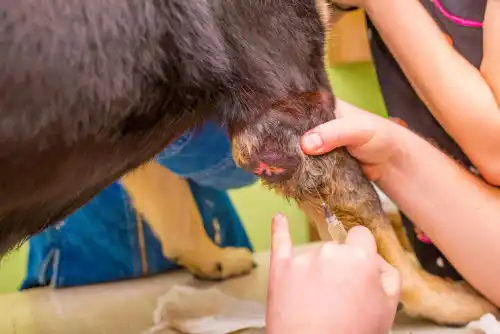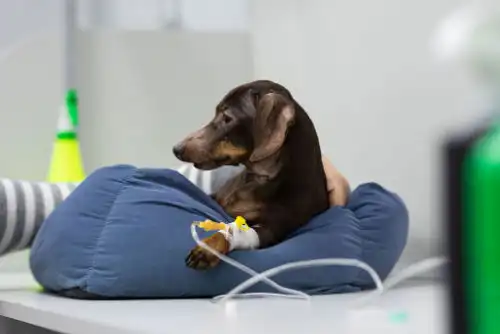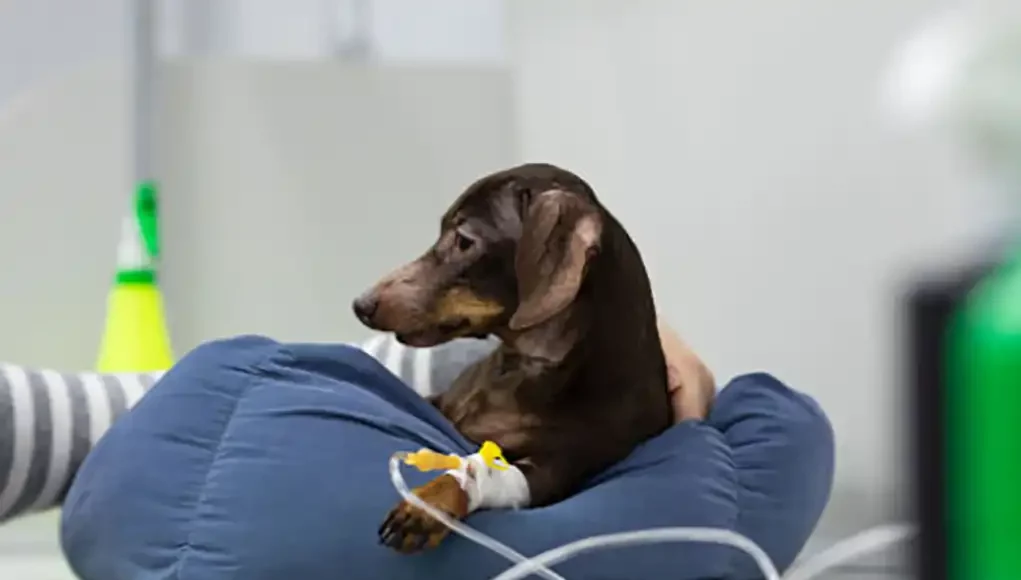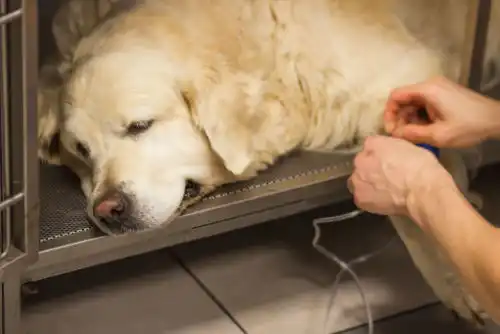Table of Contents
- What Is Chemotherapy in Dogs?
- When Is Chemotherapy Recommended for A Dog?
- How Much Does Chemotherapy for Dogs Cost?
- How Long Does Chemo Treatment Last?
- What to Expect During Chemotherapy Treatment?
- What Are the Side Effects of Chemotherapy on Dogs?
- Are There Alternative Treatments for Dogs with Cancer?
- Chemotherapy in Dogs: Closing Thoughts
Hearing a cancer diagnosis for your dog is heartbreaking.
Cancer affects almost 25 percent of all dogs. The shock of a cancer diagnosis is real and can lead to a strong emotional response.
We're here to provide you with information and to help you make the best decisions possible.
The hard reality is that cancer is the leading cause of death for older pets.
So, what are your options?
Can chemotherapy help?
What about its side effects?
This article will answer all your questions regarding chemotherapy for dogs.

What Is Chemotherapy in Dogs?
If you are unaware, chemotherapy is the leading treatment for cancer patients.
It involves using strong drugs to kill fast-growing cells.
Cancer cells multiply much faster than normal cells, so chemotherapy is an ideal treatment.
For humans, chemotherapy is well-researched, and dosages are consistent across multiple cases.
However, when it comes to dogs, different breeds require specific dosages.
This is because dog breeds are drastically different in size.
When Is Chemotherapy Recommended for A Dog?
Chemotherapy is only used to treat certain types of cancer.
A veterinary oncologist may recommend chemotherapy based on the type and stage of cancer.
This and factors like age and breed will determine the best course of action.
Mastocytoma and Carcinoid Cancer are prevalent in dogs and should be diagnosed and treated as early as possible.
Chemotherapy aims to eliminate or control these cancers while providing your pet's best quality of life.
How Much Does Chemotherapy for Dogs Cost?
Like any medical treatment, the cost of chemotherapy will depend on its frequency, the drugs used, and where you live.
Many types of cancer have different stages.
These stages are the key to determining how much chemotherapy is required.
A standard chemotherapy protocol for lymphoma can cost anywhere from $1000 to more than $5000.
The best thing is to talk with your veterinarian about the optimal course of action based on your budget.
Pet insurance will cover the cost of treatment in most cases, but this will depend on your policy and company.
Some companies require a cancer rider for dogs prone to certain cancers.
How Long Does Chemo Treatment Last?
Much like cost, the duration of chemotherapy depends entirely on the type and stage of cancer.
If the cancer is eliminated or goes into remission, then chemotherapy will be ceased.
But your dog will likely need medication throughout their lifetime.
Most treatments have weekly or bi-weekly appointments that can last for months.
Even after the treatment, you may have to visit for follow-ups every four to six weeks.
Chemotherapy is unique for every case, as the drugs administered and the duration is based on various factors.
Most standard chemo protocols for lymphoma last anywhere from 16 to 24 weeks.

What to Expect During Chemotherapy Treatment?
Chemotherapy is administered intravenously with a syringe.
This usually takes just a few minutes, but your dog may be kept at the clinic longer for observation.
Each appointment is usually around an hour long.
Oral chemotherapy treatments also exist, and these can be given at home.
Ask your veterinarian if these are a good option for your pet, and always follow their advice.
There are multiple drugs used for chemotherapy, and they vary in strength.
Heavier doses are usually required if the cancer is at a later stage.
However, your dog will experience more side effects with more potent treatments.
What Are the Side Effects of Chemotherapy on Dogs?
The side effects of chemotherapy in dogs are a bit different from those experienced by humans.
Due to the smaller dosages, side effects in dogs are minimal.
Most dogs do not experience any side effects at all.
Unlike humans, hair loss is also minimal.
Chemotherapy drugs kill both abnormal and some normal cells.
This is the reason for many of the side effects experienced during treatment.
The most common side effects of chemotherapy in dogs are:
- Vomiting
- Diarrhea
- Loss of appetite
- Low energy levels
These side effects are intermittent and usually resolve within a few days.
Homemade dog food can help alleviate these side effects.
If your dog is still experiencing these symptoms after two days, you should visit your veterinarian.
Chemotherapy will also affect your dog's bone marrow, which produces blood cells.
Thus, low white blood cells are chemotherapy's most common side effect.
White blood cells help fight infections and diseases, so you should take extra care of your pet.
Are There Alternative Treatments for Dogs with Cancer?
There are many treatment options available for cancer.
Among these are radiation, immunotherapy, surgery, and even oral pills.
Your veterinarian may recommend any combination of these as the best course of action.
Low dosage chemotherapy, along with these treatments, is also an option.
The best thing to do is to visit a veterinary oncologist to get a proper diagnosis of the type of cancer and its stage.
These factors will determine what treatment is best for your dog.
Do not forget to get a second opinion.
Often, a second opinion can shed more light on the situation, allowing you to make a more informed decision.
If possible, you should talk to people who have gone through similar treatments for their dogs.
Surgery
Surgery and chemotherapy often go hand in hand. Your veterinarian may recommend surgery to remove the cancer cells along with chemotherapy. This will help ensure that cancer does not return and is eliminated for good.
Keep in mind that, unlike chemotherapy on its own, surgery is an invasive procedure.
It carries risks and will require overnight observation. Recovery will depend on the extent of the procedure but usually takes a couple of weeks.
Chemotherapy in Dogs: Closing Thoughts
Your pet will most likely beat cancer if detected as early as possible. Make sure to visit the vet regularly to get your lovable dog checked.
Cancer can have environmental causes, or it can be purely genetic. Narrowing down the cause may help slow or stop cancer growth.
Many options are available for treating cancer, but chemotherapy is the most effective choice.
Consult a veterinary oncologist and decide to maximize the quality of your dog's life.
Cancer is not the end. With proper treatment, your pet can live a long and healthy life.














